Editorial: Sorry Kotaku, but you're wrong about pro-gaming

I love e-sports. I mean, I really, really love e-sports. I love e-sports so much that when IMNestea played the then-named BoxeR in the Global StarCraft II League's season 2 final , I woke my girlfriend up at some unearthly hour in the morning and crowed at her about marine splitting until she had to physically leave the room. I've organised parties based solely around the activity of watching other people play games, many thousands of miles away. I say it here, on this wide internet, and I don't care who knows – I love e-sports.
But I didn't always love e-sports. If I went back in time to exactly one year ago, found myself, and said “YOU WILL LOVE E-SPORTS IN A YEAR'S TIME!”, year-younger me would've scoffed in my face. I've been aware of e-sports for as long as I've been a PC gamer: I lived through the false dawns of the early 21st Century, the Sujoy Roys and the Jonathan Wendels coming so close to pushing the activity of pro-gaming into the spotlight, then falling short at some intangible hurdle. Time and again I was promised the rise of Quake, or Counter-Strike, or some other competitive game in the televised market; time and time again they failed to ignite among the wider gaming community.
I could well have reacted like Kotaku's Jen Schiller did, when she repurposed an interview between Team Dignitas ' David ' Zaccubus ' Treacy, and top-end PC hardware types Alienware . Her post treats e-sports as weird and unnatural: a vestigial limb on the wider gaming animal that we'd all do better to hide under a coat. She makes her feelings about pro-gaming clear:
“Don't get me wrong, I love watching people who are better than me at video games play them for money, especially when I don't know those people.
Oh wait. No I don't.”
Jen penned another response , after seeing the reaction her original post dredged up from the e-sports community. Jen defends herself by claiming ignorance of the scene. A year ago, I could've claimed the same.
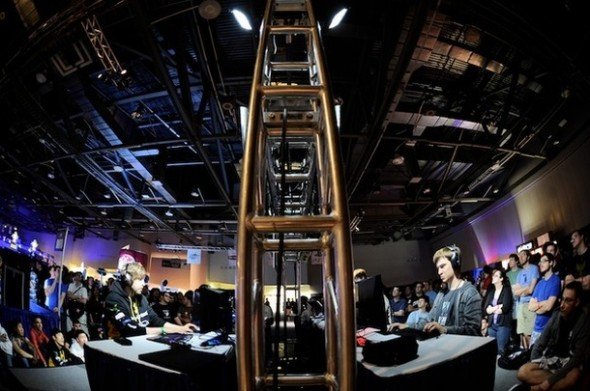
For me, that year's length – and the month of July in particular – are key. StarCraft II came out on July the 27th, 2010. I bought a copy, installed it, and left it alone. I'd played the original's single-player for a spell, and had become vaguely aware of a kind of mad, otherworldly pro-gaming industry that had built up around in off in South Korea. It sounded strange to my western ears, like those Japanese shows we see Youtube clips of where a man attaches himself to a bungee rope and tries to run at some meat. Why would they play StarCraft, of all games? Have they not heard of TF2?
The biggest gaming news, reviews and hardware deals
Keep up to date with the most important stories and the best deals, as picked by the PC Gamer team.
I can't remember what it was that called me to StarCraft II's multiplayer - boredom, sirensong, my overtly competitive nature – but I'd built the mythical South Korean scene into a monstrous mass of talent, all ready to smash my tiny face off should I step into the online ring. Something weird happened. I won my first game. I won more. I lost lots, but I lost because I failed at completing an observable task. Here was a game I could demonstrably get better at.
And I did. Perhaps the defining moment in my attitude switch toward StarCraft II – from multiplayer timewaster to genuine practice – was my first foray into e-sports.
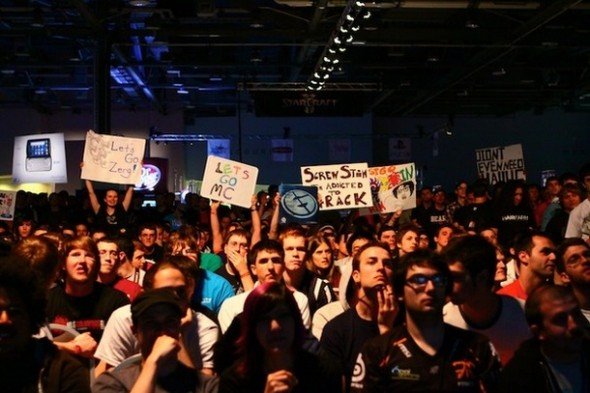
I began to watch other people play. People better than me, people playing videogames for money, people I didn't know. I had no illusions that I'd ever join their ranks, but the sheer pleasure of nabbing tips and tricks that high-level players used, reappropriating them in my games, and watching myself get better was one that I couldn't replicate.
That's largely in part to the community. The old e-sports organism survived as contained cells – little pockets of internet that the general wanderer would come across, get bewildered by, then quietly close down. With years to get acquainted with their games, the news posts referred to mysterious tournaments, their forums dropped arcane terms like they were real human words. For the outsider, these places were scary. That was old e-sports.
In this space-year 2011, more new personalities have arisen in the world of competitive gaming than (I'd wager, not technically knowing) have ever before. In my personal StarCraft II sphere, we've got figureheads like Day[9] (who I had the pleasure to interview), djWHEAT , JP McDaniel , and commentators like Artosis , Tasteless , Husky and Diggity . League of Legends has a similar range of figures, people like Reginald from Solomid.net , Phreak , and FourCourtJester often allowing other players a window into their world by streaming their games. Even Street Fighter IV – with its focus on the coughspit consoles – has mini-celebs like Mike Ross and Gootecks pushing their infectious enthusiasm and hardcore knowledge.
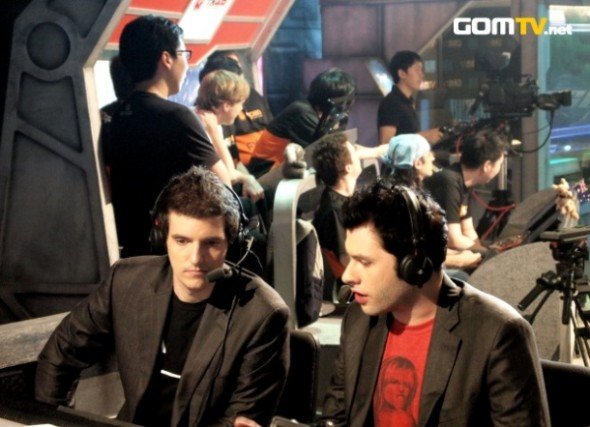
E-sports is currently the healthiest it has ever been. There's always the fear that these are famous last words, the things inscribed on the gravestone in two years time when the sponsorship deals dry up, but I've been to the future and I can tell you that's incorrect. Here, I brought back facts to back me up.
Fact one! We're currently blessed with a set of triple-A quality games that at an early stage in development set out to be sports . These games – with StarCraft II, League of Legends, and Street Fighter IV leading the charge – were tested to the ninth plane of hell, and came back near-perfectly balanced (quiet with the “imba!” chatter). Previous e-sports darlings weren't. Counter-Strike was a great mod that got lucky. Blizzard never knew StarCraft would explode in the east like it did. And Quake III – while it has the best claim – didn't benefit from the on-the-fly game adjustments today's internet connections allow.
Fact the second. Most previous pro-gaming titles were shooters; modern heroes aren't. It's incredibly hard to present footage of a classic team deathmatch game. As the observer, you're either tied to a player, or stuck floating around the map like a flustered ghost, late to the action. Recent pro-gaming vehicles are strategy or fighting games: much easier to watch from a detached, overhead view while still receiving all pertinent information.
Third fact. Current e-sports are bright, colourful, and surprisingly easy to read. Take StarCraft II as an example: common sense says ten men kill five men when they've both got the same guns. A child could make the connection, and see why one player is doing notably better than the other. A particularly alert dog probably could. There is, of course, infinite layers of nuance behind each unit, action, and decision - but for the basics you don't need a rulebook. Man shoot, other man fall down, everyone cheer. Yay!
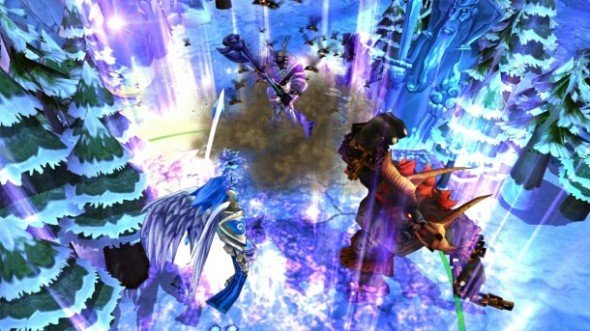
The Kotaku article references a downturn in e-sports. Zaccubus – who I've had the pleasure to get absolutely robo-pwned by – has a history in professional shooters. This corner of the market was propped up by pro-gaming behemoths Counter-Strike and Quake III: both of which are now well over a decade old. A mild lull, while players get reacquainted with new games, set their talents loose on similar mechanics encased in prettier games, or move onto new sectors, is to be expected. Jen, in her article, equates the slow decline of games released in the 20th Century with a general death of an entire sector of entertainment.
To suggest e-sports is declining is empirically incorrect. Not when companies across games and across oceans competing to give away the largest prize pot – Riot Games handing $50,000 to their season 1 LoL winner, GomTV giving $100,000 to GSL winners. Not when 1.7 million people tune in to watch the very first televised League of Legends professional season . Not when 15,000 people turn up in the city of Columbus, Ohio, to attend the travelling Major League Gaming event - joined by 22 and a half million stream views from people across the globe. This kind of basic research undermines Jen's point that it's not something she's interested in, and therefore has no exposure to it: these tournaments have pushed so far into the mainstream space that they're no longer confined to their own little hospice wards.
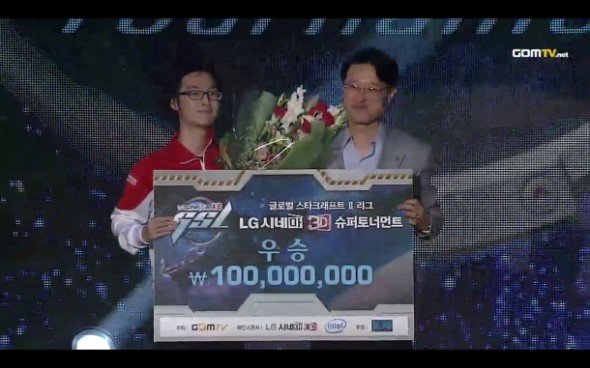
Gaming's rapidly shedding its social stigma. Over half of the people in the UK are considered active gamers: our hobby is not the preserve of the maladjusted or socially weird. Why then, articles like Jen's feel the need to disparage a rapidly growing, incredibly exciting offshoot of general gaming, purely because it's not a traditional prism through which to view games?
When I spoke to Sean 'Day[9]' Plott about the social attitudes to gaming, he said that he'd always responded to any insults with genuine enthusiasm: “oh, do you play games? Let me tell you why they're great.” This is the approach we should take – particularly us as PC gamers. I am so very glad I discovered e-sports. The pro-gaming community is passionate and knowledgeable like few others, and they grew from our platform. A year ago, gaming at large could've claimed ignorance. To do so now is inexcusable. Watching people 'better than you at video games play them for money, especially when you don't know those people' might not be your cup of tea, but dismissing the subject out of hand is exactly the kind of closed-minded reactionary behaviour we rail so hard against when it's directed at gaming as a whole.
You never know, you might grow to love e-sports. I know I did.

